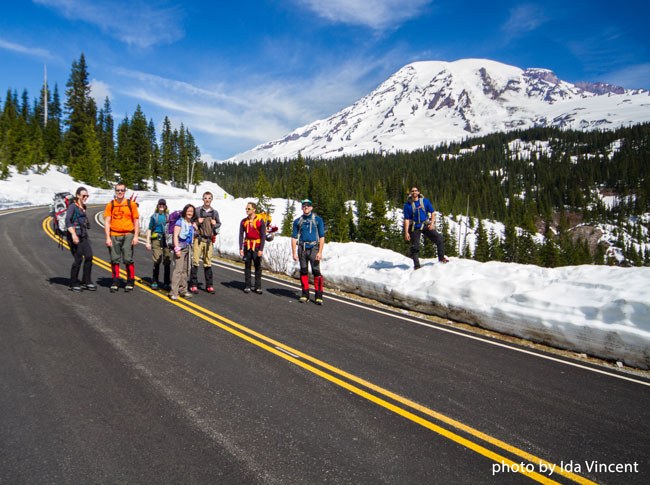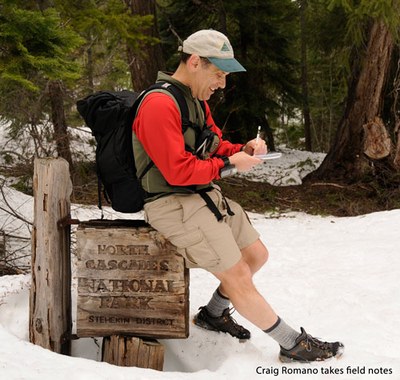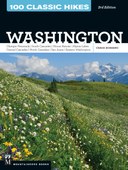
by Craig Romano
My plan was initially without a hitch. Hike from Longmire on the Wonderland Trail to Indian Henry’s Hunting Ground. Do a little photography in those famed fields, visit the Mirror Lakes and then head back out via the Kautz Creek Trail. It would be a nice 14.5-mile hike with some decent elevation gain. My hiking partner would leave a car at the Kautz Creek trailhead and we would drive back to Longmire to retrieve my vehicle. Plan was good — until my hiking partner couldn’t make it. I was on assignment, so the hike would go on.
When I made it to the Kautz Creek Trailhead at the end of the day, I figured I’d just start walking the three plus miles up the road back to my truck. It soon became apparent that the walk was less than enjoyable. The road was narrow. It was a Friday evening with lots of traffic. And there was construction leaving the road even narrower and full of hazards.
That’s when the thought occurred to me to hitch a ride back to Longmire. I almost never hitchhike, nor pickup hitchhikers. I can count the times on one hand (and a thumb) how many times I have resorted to this mode of transportation or helped someone else with it. And except for one time on Orcas Island, it was always within a national park. These are places that I feel fairly safe giving rides and asking for a ride. Miscreants as a general rule aren’t usually in national parks looking to pick up and make life difficult for folks.
One of my most memorable national park experiences involved hitchhiking. Upon missing a bus in Chile’s Lauca National Park, my partner and I realized that we could be stuck in the middle of nowhere for days. So, naturally we started hitching.
Within several hours, we were offered a ride by a nice Chilean family on holiday. Their car was small. We had to tie our packs to the roof. My partner and I sat in the backseat, each with one of their children on our laps. When we finally arrived at our destination many hours later, I went to thank our travel angel with what was then (1988) the equivalent of a $20 US bill. No small change in Chile at the time. They refused to take it and just wanted us to have a great trip and to remember well their country and the Chilean people. We certainly did!
Evidently however (as I will shortly reveal), if a couple of Chilean backpackers were stranded in Mount Rainier National Park, they may get an experience that won’t leave them remembering our country as fondly.
As I stuck my thumb out and watched several cars drive by, I kept plodding up the busy and unsafe roadway. Finally a park ranger arrived — more specifically a law enforcement agent. Cool, I thought, I’m going to get a ride.
That didn’t happen. Instead I got hassled! The law enforcement officer rolled down her window and, without asking me if everything was okay — if I had car trouble, if I was hurt, etc., said in a firm and authoritative voice, “Who are you and what are you doing?”
It was obvious what I was doing — and I told her who I am. Either she never heard of me or wasn’t impressed with my writing, as the next thing that came out of her was “Hitchhiking is illegal in the park.” Dumfounded and a little put off by the coldness of her repoire, I explained to her why I was hitchhiking to avoid walking on a dangerous road. This was followed by another firm, “Hitchhiking is illegal in the park.” Now, normally I am respectful of authority — especially our rangers — but I couldn’t understand for the life of me on why she was giving me such a hard time for what I perceived as a non-issue. My East Coast sarcasm kicked in, “Ohhh a federal offense!”
She continued to give me a hard time in which case I just said, “Obviously you aren’t going to help me — thanks (sarcastically).” I then proceeded to walk up the road. She drove off. I immediately felt terrible over the exchange. I didn’t like that I became ugly — that is not like me when dealing with our land managers. But I was also upset and dismayed at how I was treated. I almost always (since I’m not a criminal or engaged in criminal activity) have great conversations and exchanges with law officers and rangers. Maybe this officer just got through with someone vandalizing the park or harassing animals. Maybe it was already a tough Friday. But really — you’re going to harass me for trying to get a ride back to my vehicle?
Eventually four army recruits from JBLM pulled over and offered me a ride — and, not trying to be lawbreaker, I wasn’t even hitchhiking. I told them my story and insisted that if questioned, they would vouch that I wasn’t soliciting a ride — that they freely gave me one. We all shared a laugh and I was back to my truck and heading home. And while at the moment I wasn’t thinking too fondly of our park rangers—I certainly had a warm feeling about our military personnel.
I did truly feel badly for getting a little wise with the LE officer. And the next day I called the park superintendent to apologize. What I also did upon returning home is do a little research on hitchhiking in the national parks. After digging through multiple websites, as hitchhiking doesn’t appear in the rules and regulations section of individual park websites, I did find out — and was quite surprised that, hitchhiking in national parks is indeed against the law.
So — yes it is a federal offense!
Wow! This new revelation sent my mind reeling back into time — transforming great memories into law breaking moments. Like the time my buddy and I ditched our bikes in southern New Mexico and hitchhiked to the Gila Cliff Dwellings National Monument. It was February and we didn’t want to bike through snow. A local rancher picked us up (unbeknownst to him that we were lawbreakers) and showed us around the Puebloan ruins.
Then there was that time back in 1999 when my wife (girlfriend at the time) and I tried to hike the Heather Park-Klahhane Ridge loop from Heart O’ the Hills, but the heavy snow pack that year had us adjusting our plan and hiking out Sunrise Ridge instead of risking crossing dangerous snowfields beneath Mount Angeles. We stood at the Hurricane Ridge parking lot to hitch a ride back to Heart O the Hills. Within minutes a nice family let us jump into the back of their pick-up. They had no idea they were transporting lawbreakers!
I wonder if I was harboring criminals when I gave three German backpackers a ride in Canada’s Kluane National Park. Other than the fact that these three intrepid fellows who must have been in the Yukon backcountry for an awfully long time emitted a noxious odor in my van, I never felt in danger for my life. But still, if I aided and abetted the transportation of law breakers in one of North America’s wildest places, what did I become?
Seriously though, I couldn’t find out if hitchhiking is illegal in Canada’s national parks, but I have a feeling that it isn’t, as hitching a ride seems to be pretty prevalent throughout our northern neighbor. And hitchhiking isn’t illegal in Washington State either, as long as you are off the road shoulder, giving potential transporters a safe spot to pick you up. But hitchhiking is illegal in the North Cascades complex, Mount Rainier National Park, and Olympic National Park. I eventually had a conversation about hitchhiking in the parks with a national park superintendant. This high ranking park personnel told me that hitchhiking is not something that they are too concerned with when it comes to park infractions. But still, it’s on the books and you can be cited and fined for doing it.
So, keep that in mind the next time you come off of the Wonderland Trail and need a ride back to your vehicle. Thumbs up or thumbs down when it comes to this law?

Add a comment
Log in to add comments.36 CFR 4.31. Don't forget to learn the CFRs before you go out to the national parks! National parks have their own set of laws set forth in the 36 CFR.
I joined as a guest just to comment on the prohibition against hitch hiking in National Parks. Just this weekend, in Arches National Park some friends and I got off route doing some canyoneering and found ourselves back at the road a few miles from where we parked. I stuck my thumb out and figured I could get the truck and go back for my friends. Within moments I was being questioned by a ranger who treated me like public enemy number one. I was advised that there was a $200.00 fine for hitch hiking in the park. This seemed absurd. More than that, it seems an infringement of a fundamental right to free speech. That's right. I am just asking fellow park visitors if they would like to help me out with a lift. It is protected speech, a fun way to see more of the park than possible without prearranged shuttles and something that should be encouraged rather than outlawed. Later that day I was also pulled over for not wearing a seatbelt and learned that infraction carries a $180 penalty. Park rangers used to be helpful and friendly. Now they are revenue generating robots.
 Craig Romano
Craig Romano
